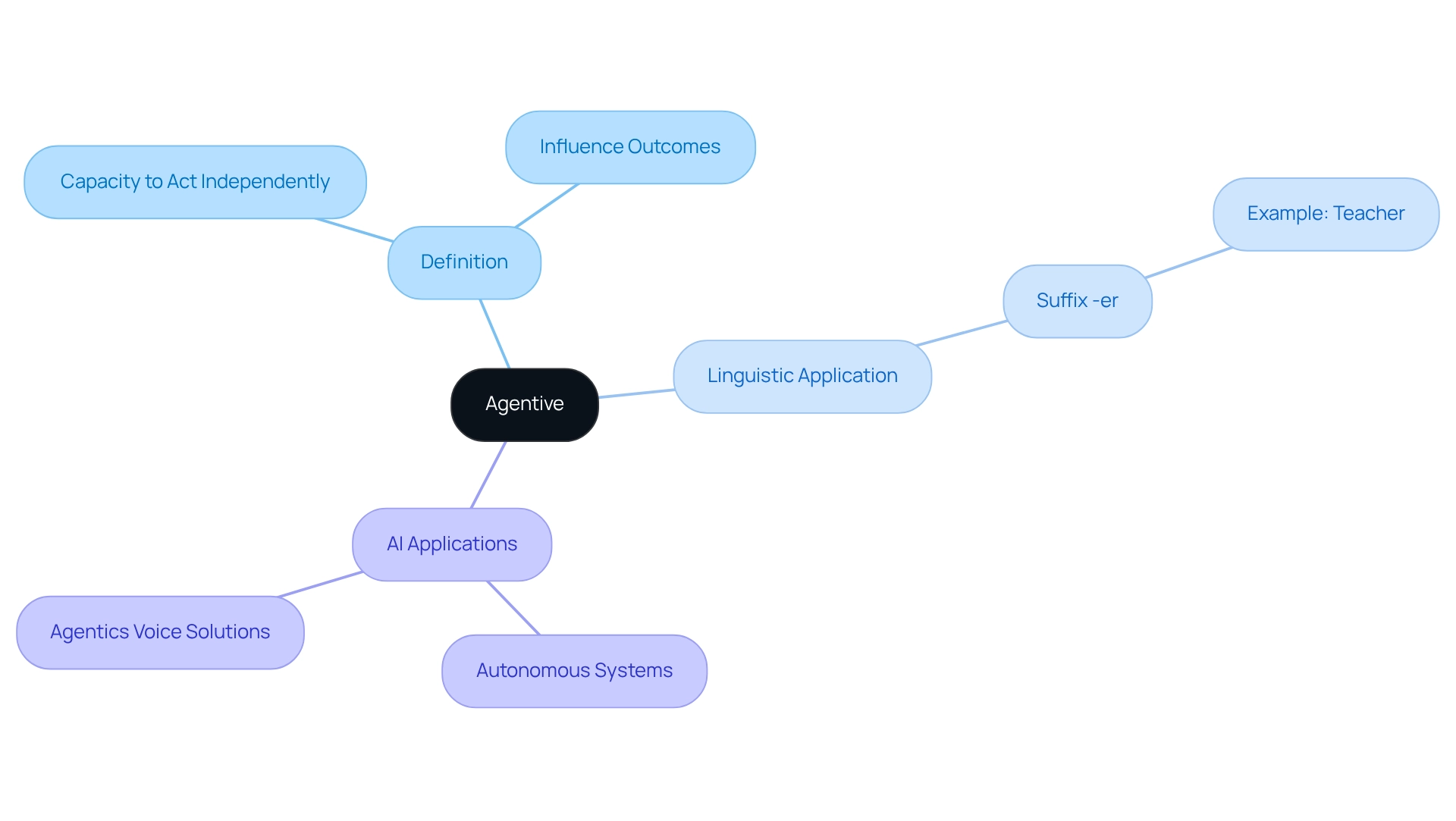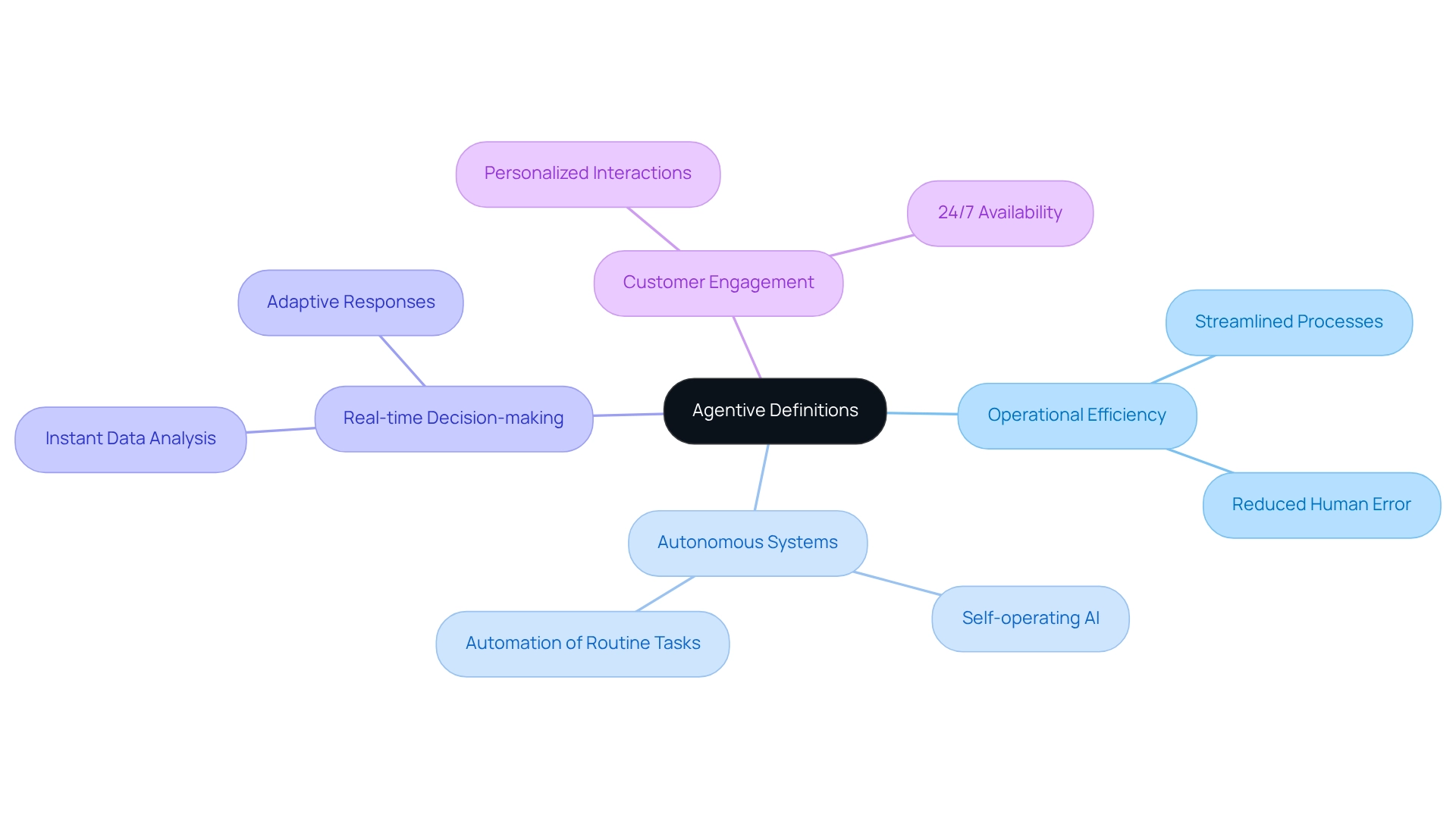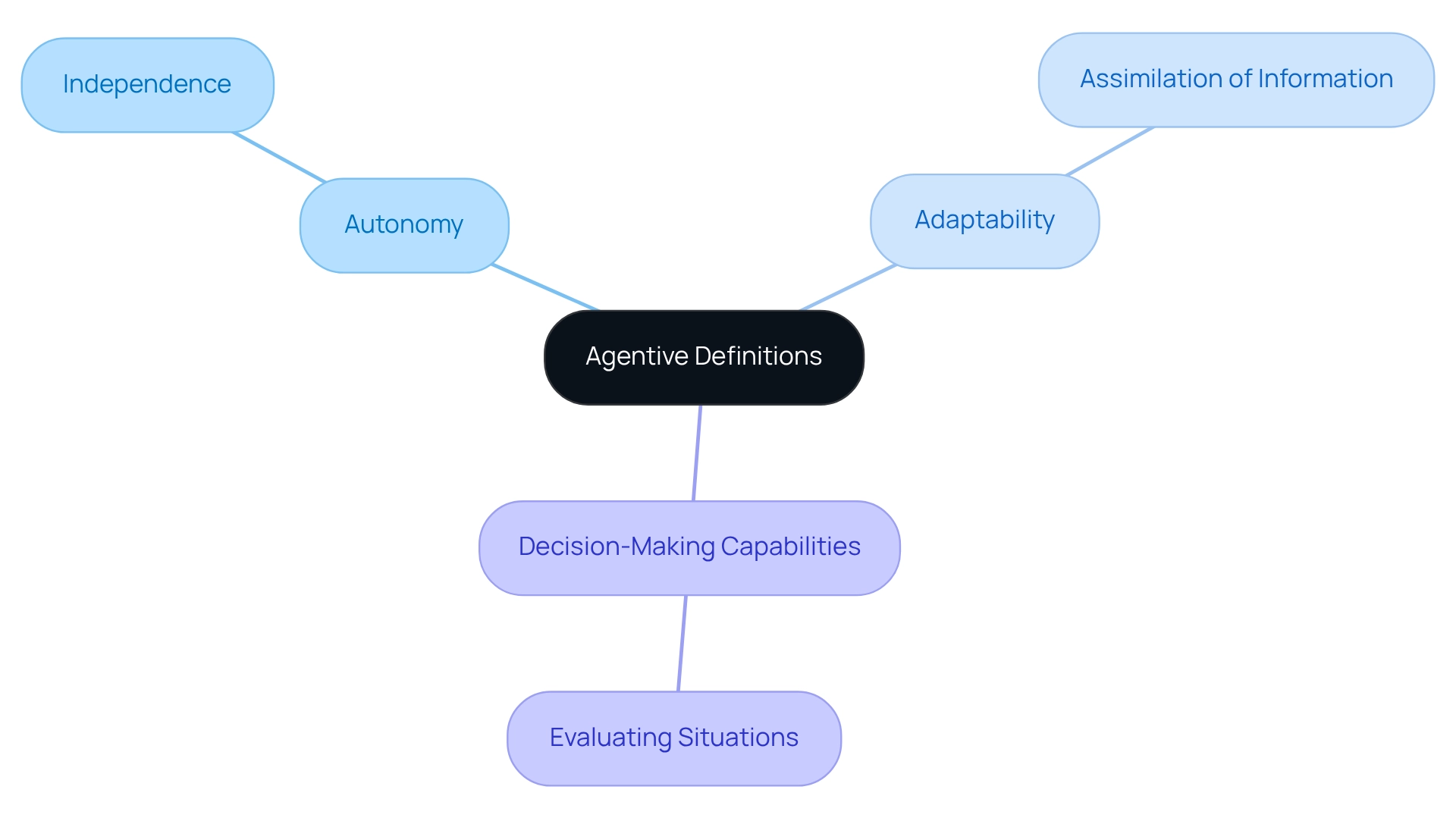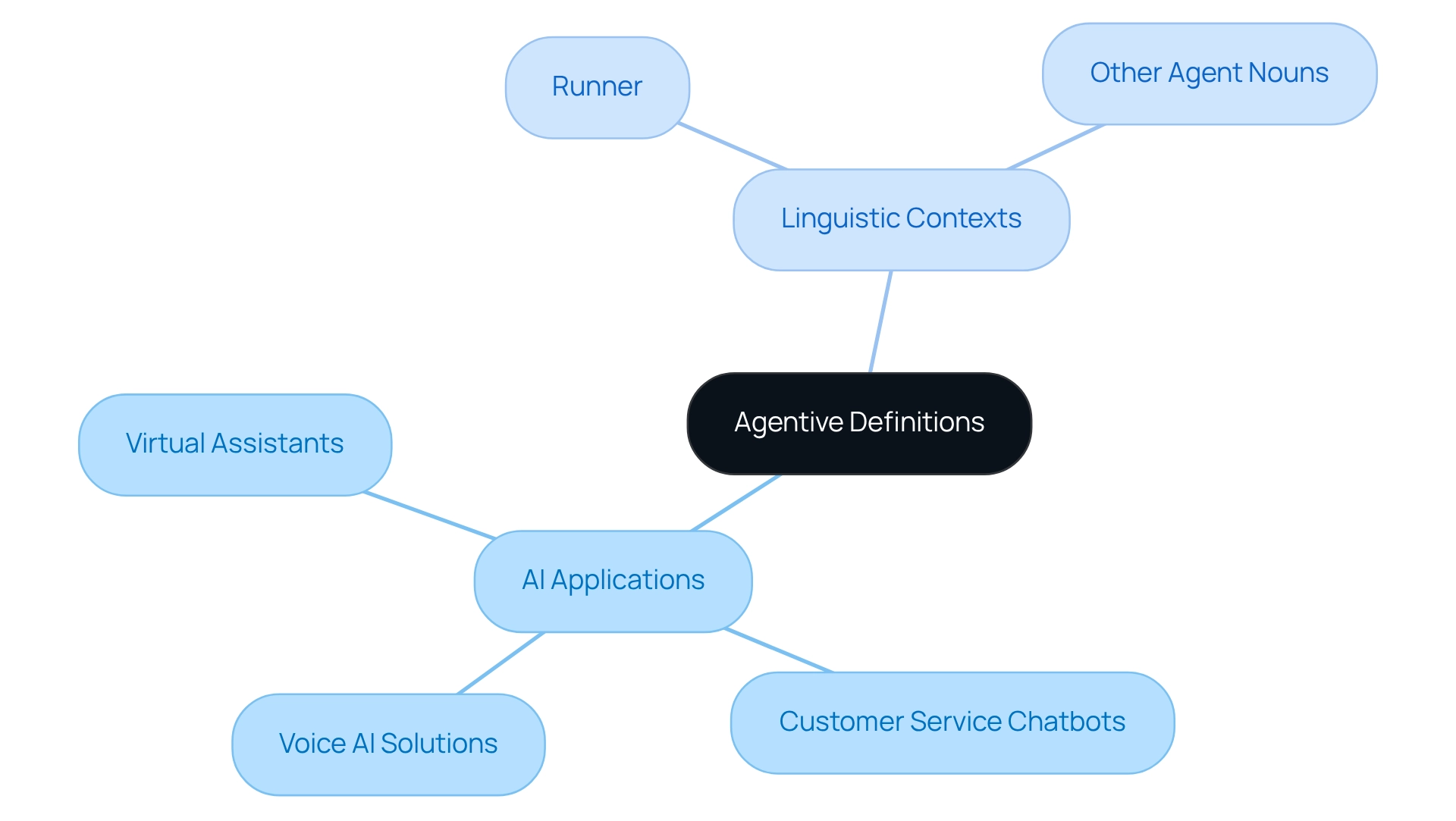
Understanding Agentive Definition: Key Characteristics and Importance
GeneralKey Highlights:
- Agentive refers to an entity’s ability to act independently and influence outcomes.
- In linguistics, agentive indicates the performer of an action, exemplified by the suffix ‘-er’ in ‘teacher.’
- Autonomous AI systems can execute tasks, adapt to new information, and make decisions independently.
- Agentics utilises autonomous AI for tailored voice solutions, enhancing customer interaction and operational efficiency.
- Key characteristics of agentive definitions include autonomy, adaptability, and decision-making capabilities.
- Autonomy allows entities to operate without human oversight, crucial for improving efficiency.
- Adaptability enables AI systems to adjust actions based on new information, enhancing organisational agility.
- Decision-making capabilities empower autonomous systems to evaluate situations and act accordingly.
- Examples of agentive definitions include virtual assistants and customer service chatbots that operate independently.
Introduction
In a world increasingly driven by technology, the concept of ‘agentive’ stands as a pivotal force reshaping the dynamics of interaction and operation among entities. At its core, agentive encapsulates the capacity of systems—particularly in artificial intelligence—to act autonomously, make informed decisions, and adapt in real time. This transformative capability is not merely a trend; it is revolutionising business communication. Organisations are leveraging agentive solutions to enhance efficiency and deepen customer engagement, paving the way for innovative strategies. By delving into the nuances of agentive definitions, we uncover profound implications for both AI applications and linguistic structures. This shift signals a movement towards a more dynamic and responsive operational landscape, one that demands our attention and action.
Define Agentive: Understanding the Concept
The agentive definition refers to an entity’s capacity to act independently and make decisions that influence outcomes. In linguistic terms, the agentive definition denotes a grammatical form that indicates the agent performing an action, exemplified by the suffix ‘-er’ in ‘teacher.’
Within the realm of AI, autonomous systems are those capable of independently executing tasks, adapting to new information, and making decisions based on their environment. This concept is crucial for understanding the agentive definition of how AI can enhance communication and improve operational efficiency in organisations.
For instance, Agentics leverages autonomous AI to create tailored voice solutions that elevate customer interaction and streamline organisational processes. This illustrates the practical applications of autonomous technology in significantly boosting overall operational efficiency.

Context and Importance of Agentive Definitions
The agentive definition plays a crucial role in the realm of AI and automation, where the ability of entities to operate independently significantly enhances operational efficiency. Intelligent AI streamlines business interactions by automating responses and facilitating real-time decision-making. This evolution from traditional interaction methods to autonomous systems represents a fundamental shift in organisational operations, resulting in faster response times and improved customer engagement. Understanding the agentive definition is essential, as it informs the development of more effective communication strategies that leverage AI technologies. Embrace the potential of AI to transform your business interactions and drive efficiency.

Key Characteristics of Agentive Definitions
The agentive definition includes key characteristics such as autonomy, adaptability, and decision-making capabilities. The agentive definition of autonomy empowers self-directed entities to operate independently, free from continuous human oversight—this independence is crucial for enterprises striving to enhance efficiency. The agentive definition of adaptability signifies the ability of these systems to assimilate new information and adjust their actions accordingly, enabling organisations to remain agile in the face of shifting market conditions. Furthermore, the agentive definition of decision-making capabilities equips autonomous systems to evaluate situations and select appropriate actions based on established objectives, thereby enriching customer engagement. Collectively, these attributes empower organisations to embrace AI solutions, such as those offered by Agentics, which not only elevate productivity but also streamline communication processes, ultimately revolutionising corporate communication.

Examples and Variations of Agentive Definitions
Instances of active definitions prominently appear across various AI applications. Consider virtual assistants like Amazon’s Alexa and Google’s Assistant, which autonomously execute tasks based on user commands. In corporate environments, intelligent AI manifests in customer service chatbots that manage inquiries independently, delivering immediate responses and solutions. Agentics leverages agent-based AI technology to enhance business communication through tailored voice AI solutions, significantly improving customer engagement and operational efficiency. Additionally, variations of doer definitions can be observed in linguistic contexts, where doer nouns signify the performer of an action, such as ‘runner’ derived from the verb ‘run.’ These examples underscore the extensive applicability of the agentive definition, highlighting its critical importance in both technology and language.

Conclusion
The exploration of agentive concepts reveals their transformative potential in both artificial intelligence and business communication. By grasping the fundamental characteristics of agentive systems—autonomy, adaptability, and decision-making abilities—organisations can harness these technologies to significantly improve operational efficiency and enhance customer engagement. This shift towards agentive solutions marks a pivotal evolution in how businesses interact with their customers, enabling faster responses and more personalised experiences.
Moreover, real-world applications of agentive AI, including virtual assistants and customer service chatbots, vividly illustrate the practical benefits of this technology. Companies like Agentics exemplify how tailored voice solutions can revolutionise communication strategies, demonstrating that the implications of agentive definitions extend beyond theoretical discussions to tangible improvements in business operations.
As organisations continue to embrace agentive systems, the importance of understanding these concepts will only intensify. The ability to act independently and adapt in real time not only redefines communication but also establishes a new standard for operational excellence in an increasingly digital landscape. Embracing this shift is crucial for businesses aiming to thrive in a competitive environment, making agentive technology an essential focus for the future.
Frequently Asked Questions
What does the term “agentive” refer to?
The term “agentive” refers to an entity’s capacity to act independently and make decisions that influence outcomes.
How is “agentive” defined in linguistic terms?
In linguistic terms, “agentive” denotes a grammatical form that indicates the agent performing an action, such as the suffix ‘-er’ in the word ‘teacher.’
What role does agentive play in artificial intelligence (AI)?
In AI, the agentive concept relates to autonomous systems that can independently execute tasks, adapt to new information, and make decisions based on their environment.
Why is understanding the agentive definition important for organisations?
Understanding the agentive definition is crucial for recognising how AI can enhance communication and improve operational efficiency within organisations.
Can you provide an example of agentive technology in use?
An example of agentive technology is Agentics, which leverages autonomous AI to create tailored voice solutions that improve customer interaction and streamline organisational processes.
Enjoyed this post? Share it with your network!
10 Best AI Sales Tools to Boost Your Team’s Performance

Discover the top 10 best AI sales tools to enhance team performance and drive revenue growth.
Mastering Test Call Numbers: A Step-by-Step Guide for Sales Directors

Elevate your communication with our guide on mastering test call numbers for sales success.
7 Ways Automated Outbound Calls Boost Sales Performance

Discover how automated outbound calls enhance sales performance and streamline communication.
